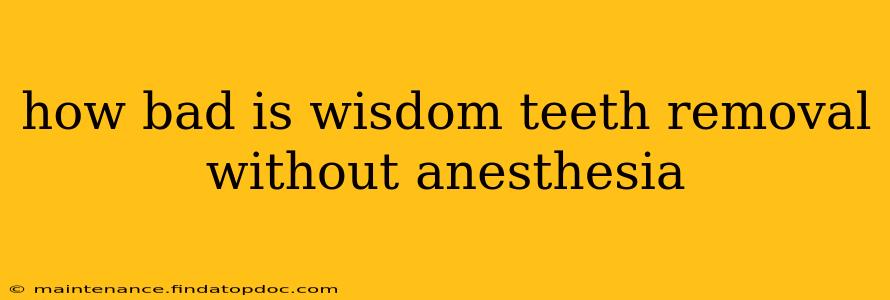Let's be clear: wisdom teeth removal without anesthesia is incredibly painful and strongly discouraged. There's a reason why modern dentistry relies on effective anesthesia for procedures like this. The experience would be excruciating, potentially leading to significant complications. This article explores the potential pain, risks, and why avoiding anesthesia for this procedure is not a viable option.
What Happens During Wisdom Teeth Removal?
Before diving into the pain aspect, let's understand the procedure. Wisdom teeth, the third molars at the back of your mouth, often emerge impacted – meaning they don't have enough room to grow properly. Removing them involves surgically cutting away bone and gum tissue to access and extract the teeth. This is a complex procedure involving significant pressure, pulling, and cutting.
How Painful Is Wisdom Teeth Removal Without Anesthesia?
Imagine the intense pressure and force required to remove a tooth embedded in bone. Now, imagine experiencing all of that without any pain relief. The pain would be unbearable, ranging from sharp, stabbing sensations to a deep, throbbing ache. The experience would likely involve:
- Severe, unrelenting pain: The procedure itself would be excruciatingly painful, and the aftereffects would be just as bad, possibly for days or even weeks.
- Uncontrolled bleeding: Removing teeth involves disrupting blood vessels; without anesthesia, managing bleeding effectively would be incredibly difficult.
- Trauma to surrounding tissues: The risk of accidental damage to nerves, adjacent teeth, or the jawbone significantly increases without the patient's ability to remain still and relaxed under anesthesia.
- Difficulty controlling the procedure: The surgeon's ability to perform the procedure safely and efficiently would be severely hampered by a struggling, writhing patient.
- Increased risk of infection: The trauma from the procedure and difficulty with post-operative care greatly increase infection risk.
What are the Risks of Wisdom Teeth Removal Without Anesthesia?
The risks far outweigh any potential benefits. Beyond the intense pain, complications could include:
- Severe bleeding: Leading to blood loss and potential anemia.
- Infection: An increased risk of dry socket (alveolar osteitis), a painful condition that can delay healing.
- Nerve damage: Damage to the nerves in the jaw can result in long-term numbness or tingling.
- Fractured jawbone: The force required to extract impacted teeth without anesthesia could result in a jaw fracture.
- Psychological trauma: The experience would be incredibly traumatic and potentially lead to dental anxiety in the future.
Can I Use Over-the-Counter Pain Relief Instead?
No. Over-the-counter pain relievers are simply inadequate to manage the level of pain involved in wisdom teeth removal. They are meant for milder pain and won't even begin to touch the extreme pain of this procedure without proper anesthesia.
What Type of Anesthesia Is Used For Wisdom Teeth Removal?
Typically, oral surgeons use a combination of local anesthesia (to numb the area) and intravenous (IV) sedation or general anesthesia (to induce sleep or unconsciousness). The choice of anesthesia depends on the complexity of the procedure and the patient's preferences and medical history.
Why Shouldn't I Consider Wisdom Teeth Removal Without Anesthesia?
The potential for severe pain, complications, and long-term health consequences far outweighs any perceived benefit of avoiding anesthesia. It's a risky and exceptionally unpleasant approach to a necessary surgical procedure. Always consult with a qualified oral surgeon for wisdom teeth removal; anesthesia is essential for a safe and comfortable experience.
Is it possible to have a very low pain tolerance and still get wisdom teeth removed?
Yes, people with low pain tolerances can still safely undergo wisdom tooth removal. Modern anesthesia techniques allow for a tailored approach, ensuring you experience minimal to no discomfort throughout the procedure and during recovery. Your oral surgeon will work with you to develop a plan that accommodates your individual needs and anxieties. Open and honest communication with your doctor is crucial.
This article provides information for educational purposes only and is not intended as medical advice. Always consult a qualified medical professional for diagnosis and treatment of any medical condition.
